Nov 18, 2023
By Fr. Tim Knepper, C.PP.S.
A while back, I went to my local barber for a haircut. He knew I was a Catholic priest, and so religious and theological topics came up all the time. He attended a non-denominational Protestant church, and so this was my small part in ecumenical dialogue.
One day, the subject that came up during the haircut was forgiveness. In the midst of the conversation, we arrived at a disagreement on my choice of shampoo, but more importantly, we disagreed on reconciliation. The way he described reconciliation still sticks with me. He said that God does reconcile the sinner, but we as Christians “bury our wounded.”
There is a type of burying in the Gospel this weekend. One of the workers in the parable, the third one who receives only one talent, buries the talent the master gives him. From the perspective of the master who beats him and takes the buried talent away from him, he was supposed to have made money off of the talent according to the master upon his return home.
There is something in the affirmation from the master to the first two servants, “Well done, my good and faithful servant,” that shapes our reading of the third servant as bad for having buried the talent he received. Why did he bury it? One possibility is that he wanted to avoid taking a risk, as the first two servants did.
It is not just money or the dead that get buried in our Christian lives. My barber was right, both about the shampoo and “burying our wounded.” It’s sometimes easier to bury more than just money or the dead to give off a sanitized version of our lives and our faith. It’s easier to try to show a life or faith devoid of any messiness or wounded-ness that is a part of real life. The stories of the saints sometimes have buried facts about them, because the authors thought that if people knew those “buried” facts about their lives, we might not call them saints anymore. God’s grace turns sinners into saints, no matter what we try to bury or keep buried.
Precious Blood spirituality leans into our wounded-ness and our wounds. “Burying our wounded” isn’t in line with who God calls us to be or how God calls us to treat one another or ourselves. To echo today’s reading from Proverbs, the wounds of Christ are precious, beyond the worth of pearls, and the importance of Christ’s wounds brings importance to our wounds too.
Our wounds are important enough to not be buried. Our wounded are important enough to not be buried. Through our wounds, we come closer to Christ, and we are strengthened by our God. Today, God calls us to remember the value of our wounds and our wounded and to unbury anything and anyone we would bury.
To view the full scripture reading, click here.

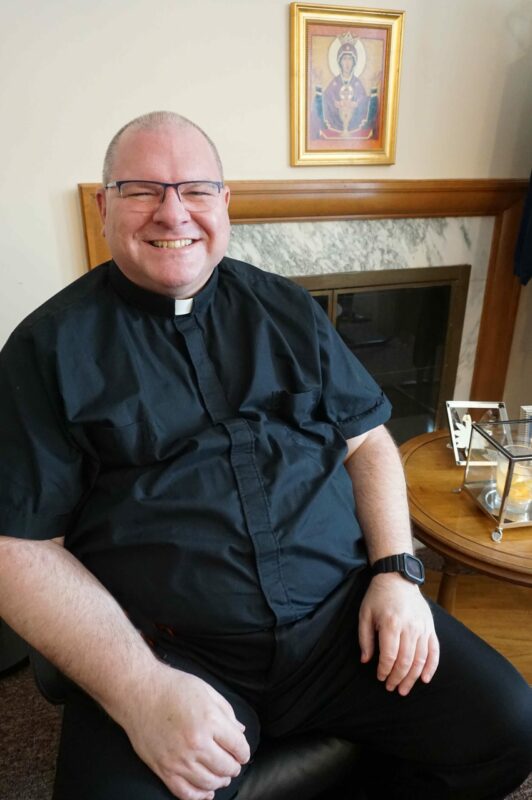
Fr. Tim Knepper, C.PP.S., is the parochial vicar of St. Joseph Catholic Church, Palm Bay, Fla. He is also a spiritual director.
Nov 4, 2023
By Fr. Bill Nordenbrock, C.PP.S.
Praying with the scriptures today has missionary images dancing and intermingling in my heart and mind.
The first image St Paul gives us: A missionary is a mother who gives life to another and nurtures that life. The mother nursing her child at her breast, the child’s eyes locked on the face of the mother. The nurturing of child with milk, and more so, with a totally selfless love for the child. A missionary/mother giving of herself with an undeniable and never-failing love. Such sweet tenderness!
The dance partner is one of my favorite Precious Blood images, the Unity or Schoenstatt crucifix. Again, this is image of a mother and child and the self-giving of a life through divine love, but here it is the child who allows his life to be poured out for another in a sacrifice of love. The ever-faithful mother at his side, at one with him in the sacrifice, receiving the Precious Blood in a chalice so that it can be shared. It is offered to me and you, so that we are brought into that same communion of salvific love. Such sweet communion!
As these images dance and intermingle they question my missionary heart and mind.
- How does the love of a mother-God nurture my life and form me to be missionary in all that is to come?
- How in my missionary life am I to be like St Paul, a self-less loving mother who tenderly creates and nurtures the life of others?
- How am I to love in a profound and sacrificial way, like the child on the cross?
- And how am I to be the vessel, the participant who shares in the sacrifice and whose life is an offering of communion?
It is the interplay of those two mother and child images that expresses the challenging Gospel message. Jesus speaks of priests and church leaders. The command to us is to ensure that our missionary preaching is authenticated by our way of life. No cheap talk is permitted. He urges us to embrace a place of humble service and avoid places and positions of privilege and honor. It is as if he says to us:
- Be like me―Drink deeply of the love of God because it will strengthen you and give you life.
- Be like my mother―give lovingly of yourself to nurture the life of the helpless and those in need.
- Be like me―willing to pour out your life as a sacrifice for the life of others.
- And be like my mother―the vessel who carries my Precious Blood into the world.

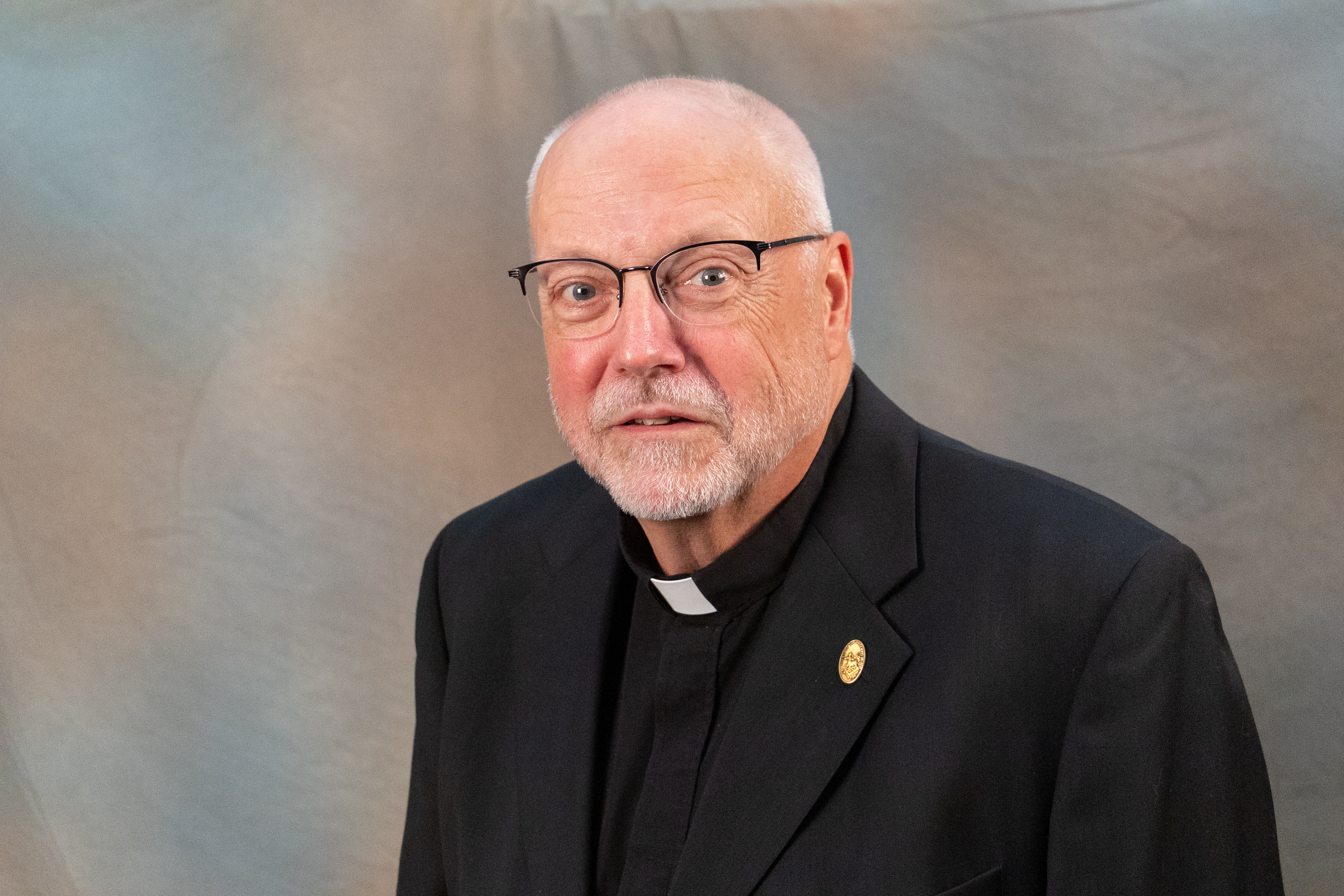 A former moderator general of the worldwide congregation, Fr. Bill Nordenbrock, C.PP.S., resides in Chicago. He serves as the provincial secretary and treasurer of the United States Province.
A former moderator general of the worldwide congregation, Fr. Bill Nordenbrock, C.PP.S., resides in Chicago. He serves as the provincial secretary and treasurer of the United States Province.
Oct 28, 2023
Christ speaks to us of the greatest commandment: “You shall love the Lord your God with all your heart, with all your soul and with all your mind.” What motivates us to do that?
We are in the time of year when seasons change and we witness the dynamic of creation.
Science tells us that planet Earth has been the process of creation for millions of years.
The last glacier covered most of Ohio between 35,000 and 12,000 years ago.
What was this creative process through which God put planet Earth to prepare a place for us where we can enjoy a fall and winter of 2023, and then another spring and summer of 2024? I remember so well as a kid looking up at the night sky over in the Best State of these United States (which is Indiana, in case you didn´t know) when there were no outside lights. I would see a sky just full of stars from east to west, from north to south, making me think of how great God is, making all this possible.
Now some 80 years later, I look up into that same sky, somewhat impaired by the streetlights and security lights of the city, but still I see a few stars, the crescent moon, half and then full and the sun in all its splendor lighting our planet every 24 hours. How can one not love a heavenly Father who has prepared planet Earth for us to enjoy?
That us is not just for us residents of beautiful Ohio, but for all humanity with whom we share planet Earth. Thus says the Lord: “You shall not molest or oppress an alien, for you were once aliens.” We hear this in our first reading from Exodus 22. We are to make immigrants welcome so they too can enjoy in 2023–24.
Changing life and God: We are pilgrims and, on our way “to serve the living and true God and await his Son from heaven, whom he raised from the dead, Jesus, who delivers us from the coming wrath,” as we hear in our second reading from 1 Thessalonians 1. Again, what a loving Father God we have, who as sent his Son, Jesus to prepare the pilgrim way through this life and into new life.

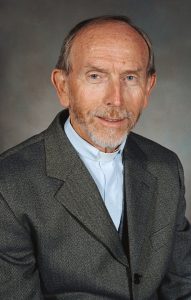
Fr. James Gaynor, C.PP.S., who served in Peru for many years, is now in ministry at the St. Gaspar Family of Parishes in Dayton.
Oct 14, 2023
By Fr. Joe Uecker, C.PP.S.
To better understand our readings for today, we ought to go back a few weeks.
Three weeks ago, you recall Jesus telling the story of the workers hired at various hours, but all receiving the same pay. The leaders of Israel do not understand.
Two weeks ago, Jesus told the story of the two sons: one said yes but did not go to work. The other said no but changed his mind and worked. Even with Jesus saying that the prostitutes and tax collectors would enter the Reign of God before the leaders, they did not repent.
Last week we heard Jesus tell the story of the owner who sent servants to get the rent from the vineyard. They mistreated and killed the servants, and even the son of the owner. So, Jesus tells them that the Reign of God will be taken from them and given to those who will produce fruit.
Jesus has been trying to tell the leaders of Israel that they need to change and to think more like God thinks:
- to be generous and rejoice at the good fortune of others
- to be able to turn from evil and do good and to forgive when others repent
- to realize that just belonging to God’s people is no guarantee
- and to know that just showing up is not enough. God wants our good works and God wants us to be messengers of the Reign of God.
The operative word here is change. Change is not easy. In my experience, the only people who like change are wet babies.
If we look at our first reading, Isaiah tells us God has chosen the Jewish people to be messengers of the Good News. “On this mountain” is Isaiah’s name for Jerusalem, the people of God.
Notice how Isaiah sees Israel as the center of God’s activity. God is using Israel as messenger of the Good News for all the nations.
God now uses us to share the Good News. At least God wants to use us. If you ask people why we are baptized, most people will say “So that I can go to heaven.” That can sound rather selfish: “So that I can go to heaven.” Would it not show a greater concern for others to say: “I am baptized so that God can use me as an instrument of Good News to others.” But in our self-centered culture, we don’t always think that way.
I’ve said this often, but I am not convinced that many people believe it. If they did believe it, why would the celebration of the sacraments of initiation—baptism, confirmation, Eucharist—so often be the end of involvement in the Church rather than the beginning? It often happens that once a person has received these three sacraments, it is “Adios, see you later, maybe when I want to get married,” rather than “Okay, now I’m ready to be sent out to serve.”
A man goes to the police academy and spends a good bit of time studying and practicing. He passes the tests and he is drives around with an experienced officer. Then comes the day of his graduation. His wife is there to pin his badge on him. Everyone congratulates him. The next day he tells the chief: “Thanks for everything. It’s been good to be with you. I wish you all good luck. You won’t be seeing me around anymore.”
We would say he is crazy; yet that happens in the Church all too often.
Do you see how different our Church would be if we lived our baptism each day instead of considering it just as our ticket to heaven?
- We would not hesitate to contact someone we haven’t seen at Mass lately.
- We would ask them if there is any way we could help them.
- We would gently encourage young people to hold off till marriage before having sex.
- And on and on.
One might well ask: But isn’t it important to think about going to heaven? It is. But that is a result. If we live our baptism, if we are messengers of the Good News of Jesus. Then when we die, we will not have to worry about going to heaven. Jesus will welcome us with open arms: “Well done, good and faithful servant; enter into the joy of your Lord.”
By being concerned about others more than ourselves, we will gain entrance into the heavenly banquet feast. Others will thank us for having shared the Good News with them, and we will be assured of having our wedding garment.
Blessed are those who are called to the wedding feast of the Lamb.

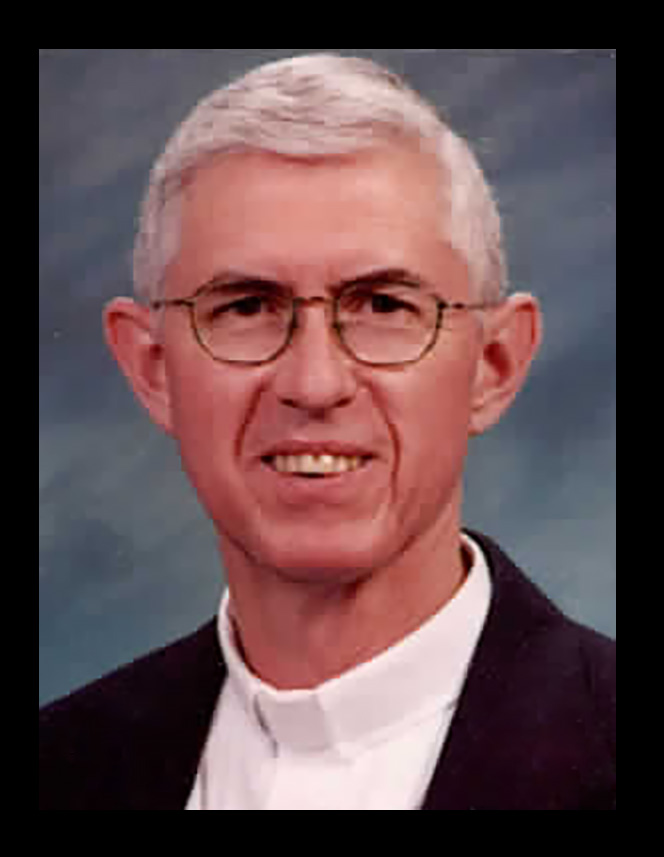
A native of Fort Wayne, Indiana, Fr. Joe Uecker, C.PP.S., has spent over 40 years in ministry in the Diocese of San Angelo, Texas. He served as pastor in San Angelo, Sweetwater, Abilene and Odessa. Since retiring in 2011, he continues to live in Odessa.
Oct 7, 2023
By Fr. Joe Nassal, C.PP.S.
Growing up on a farm, CP Estes knew her family had burned the land from time to time because “the ash made tired ground more fertile again.” But after one such burning, she asked her uncle what he would plant in the field and was surprised when he told her, “I will seed nothing.” Her uncle told her he would leave the landed unseeded “as an invitation.”
For just as it “was a blessing to welcome the stranger, to give comfort to the wanderer, and especially to the weary traveler,” her uncle told her, “So, too, the land has the hospitality of the true host. For the earth is so patient. It takes the seed, the weed, the tree, the flower; it takes the rain, the grain, and the fire. It allows and invites entry. It is the perfect host.”
Practicing hospitality is a hallmark of our Precious Blood spirituality. Unfortunately, many in our world have failed to listen to what the Earth seeks to teach us about hospitality. Sometimes it takes hurricanes and floods and wildfires to get our attention about climate change and global warming.
Our unwillingness to listen to the Earth, to learn from nature, is also reflected in our relationships with one another, especially with people from other cultures or creeds, with people who hold different views or who see through a different lens than we do.
Both the first reading from the prophet Isaiah and the parable from Matthew’s Gospel speak of being good stewards of God’s vineyard. In the parable, the tenant farmers go to the extremes by not only refusing to offer hospitality to those sent by the owner of the vineyard for his share of the produce but turning to violence. They even kill some of the messengers the owner sends to negotiate with the grape growers. Even when he sends his own son, the farmers “seize him, drag him outside the vineyard, and kill him.”
The parable reminds us how redemption and new life come out of ruin. The rejection suffered by Jesus will be the means of salvation for the world. Jesus is “the stone rejected by the builders” that becomes the cornerstone of a new creation.
In the vineyard of today’s world, the harvest of justice seems to be far off. Instead of harvesting hope, justice and peace in this vineyard, so many people taste only sour grapes of wrath, of war, of violence, and exclusion.
In these dangerous times, we draw some measure of hope—and a large challenge—from the message of St. Paul in the second reading. Our challenge is to cultivate an attitude that Paul describes: “Have no anxiety at all, but in everything, by prayer and petition, with thanksgiving, make your requests known to God.” If we live the qualities Paul outlines—truth, honor, justice, purity, graciousness and love—then “the peace of God that surpasses all understanding will guard your hearts and minds in Christ Jesus.”
All of us have anxieties, all of us claim more than a few fears, and all of us have known failures even after our best efforts. There is certainly more than enough to be anxious about in our world today, but our challenge is to trust that in our prayer, when we live with grateful hearts, we will know “the God of peace will be with us.”
As people who work and pray in the vineyard of the Precious Blood, we believe it is out of the ashes that new hope will rise. At every Eucharist, we celebrate how God takes our failures and transforms them into a future full of hope. For it was on the night he was betrayed, that Jesus gave us the greatest of gifts, his body and blood.
Though at times we feel like tired ground, worn out and weary of life, unable to produce a harvest of justice; though at times we taste the bitter disappointments of life and respond with sour grapes; though at times sickness and loss and the death of loved ones stop us in our tracks, we proclaim our belief that God will continue to bring new life, new hope, and new growth out of the ashes of our lives.

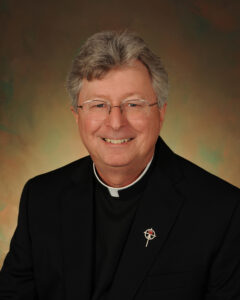 Fr. Joe Nassal, C.PP.S., a noted author, preacher and retreat leader, also serves as vice provincial director of the Missionaries of the Precious Blood, United States Province.
Fr. Joe Nassal, C.PP.S., a noted author, preacher and retreat leader, also serves as vice provincial director of the Missionaries of the Precious Blood, United States Province.
Sep 30, 2023
Brother Tom Bohman, C.PP.S.
Life is not fair. Among my favorite Ohio professional sport teams, I note that there are many rocky roads. We wish that we would always be on the winning side but as in life, we find that we are tested in our loyalties. It seems that faith also tests our loyalties. God demands our loyalty and then extends his mercy.
God’s mercy is always present. God is good all the time. There are good days and bad days. God reminds us today that we are blessed. Many times we stray from the Lord. We seek our own ways away from what God calls us to. Life is easier when we try to glimpse the many good things he gives us.
Psalm 25 and Ezekiel 18 speak of God’s justice and God’s mercies. We remind ourselves that we dedicate ourselves to God, we pray and worship as Catholics. We are generous in giving alms. Yet we also admit that we can do better in all we do and that we do not always stay on the path of righteousness.
The readings today are brief and to the point. Philippians 2 and Matthew 21 continue our journey towards faithfulness. Jesus challenges the people to do the will of his Father. We should be like the first son, whose path eventually seeks the will of God. The most important thing is that God allows us to find the way and that we indeed do what is right.
The writer of Matthew points towards future challenges by the priests and elders on Jesus’ journey towards Calvary. God is merciful. We ask God for His mercy in all of challenges in life. Our eye is on heaven well beyond baseball championships.

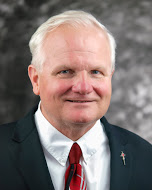
Brother Tom Bohman, C.PP.S., is in ministry at St. James the Less Church in Columbus, Ohio.
![]()





 Fr. Joe Nassal, C.PP.S., a noted author, preacher and retreat leader, also serves as vice provincial director of the Missionaries of the Precious Blood, United States Province.
Fr. Joe Nassal, C.PP.S., a noted author, preacher and retreat leader, also serves as vice provincial director of the Missionaries of the Precious Blood, United States Province.